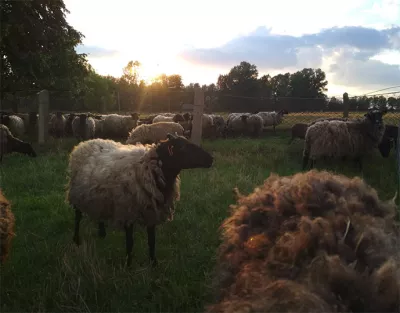General information
RDP Priority
- P4. Ecosystems management
RDP Focus Area
- 4A: Biodiversity restoration, preservation & enhancement
RDP Measure
- M11: Organic farming
Beneficiary type
- Young farmer
Summary
Szczepan Leszczyński is a young farmer who decided to start his agricultural activity by breeding the native Wrzosówka sheep. This breed of sheep is very resistant to unfavourable climatic conditions but is at risk of extinction since it has not been as profitable as other commercial breeds. The young farmer received CAP support for organic farming, which enabled him to develop and sustain his extensive livestock breeding farm while improving the biodiversity of its meadows and pastures.
Results
- Resilience of a native livestock breed is reinforced.
- Natural grazing and organic animal husbandry are helping to improve the diversity of plants and birds on the farm’s land.

Promoter
Szczepan Leszczyński
Funding
Total budget: 58 739 (PLN)
RDP support: 33 739 (PLN)
Private/own: 25 000 (PLN)
Resources
Documents
Good Practice Report - Breeding the native Wrzosówka sheep
(PDF – 1.09 MB)
Context
Szczepan Leszczyński is a young farmer who started his own agricultural activity, breeding the native Wrzosówka sheep on his family’s farm. The farm covers an area of 10 hectares in the Podlaskie Voivodeship in Siemiatycze County. The Wrzosówka sheep are very resistant to unfavourable climatic conditions, and their extensive breeding also has a positive impact on the environment. However, the breed is at risk of extinction due to competition from extensive animal production.
The investment opportunities associated with a conversion to organic farming have provided Szczepan with an opportunity to develop his sheep breeding business. He is motivated by the possibility of producing high-quality food without chemical inputs, combining sustainable animal and plant production with environmental protection. The financial support offered under Measure M11 of the Polish 2014-2020 RDP has been a major influence on Szczepan’s decision to stay on his family’s farm and continue agricultural production.
Objectives
The aim of the project was to develop the farm and breed the native Wrzosówka sheep to produce high-quality food without having a negative impact on the environment.
Activities
The following activities were implemented:
- Developing an ecological activity plan for the farm.
- Purchasing and leasing agricultural land and using it for organic farming.
- Purchasing a herd of 50 native Wrzosówka sheep.
- Adapting the farm building for livestock breeding.
Main results
- Resilience of a native livestock breed is reinforced and organic farming practices are sustained.
- Preparing an ecological activity plan has enabled the farmer to conduct systematic breeding in accordance with the principles of animal welfare and environmental protection.
- Natural grazing is helping to improve the diversity of plants and birds on the farm’s pastures. This has, in turn, further improved the conditions for animal breeding and rearing.
Key lessons
- There are many other areas of Poland (especially in Podlasie) where the rearing and grazing of native breeds could be successfully carried out. However, due to a lack of promotion, limited support and the specific conditions that would make this activity profitable, the practice is still not as widespread as it could be. Low profitability is partly related to a lack of slaughterhouses and short supply chains, which results in low margins for the producer despite the high prices paid by consumers.
- Rural development measures such as organic farming, agri-environment-climate, and animal welfare are key tools for allowing farmers to produce high-quality food and protect the environment. Without support from the RDP through measure M11, an organic farm would not be as competitive as a conventional farm.
Organic farming makes it possible to produce high-quality, healthy food while having a positive impact on the natural environment. It allows small farms to develop and be taken over by young farmers remaining in the countryside
